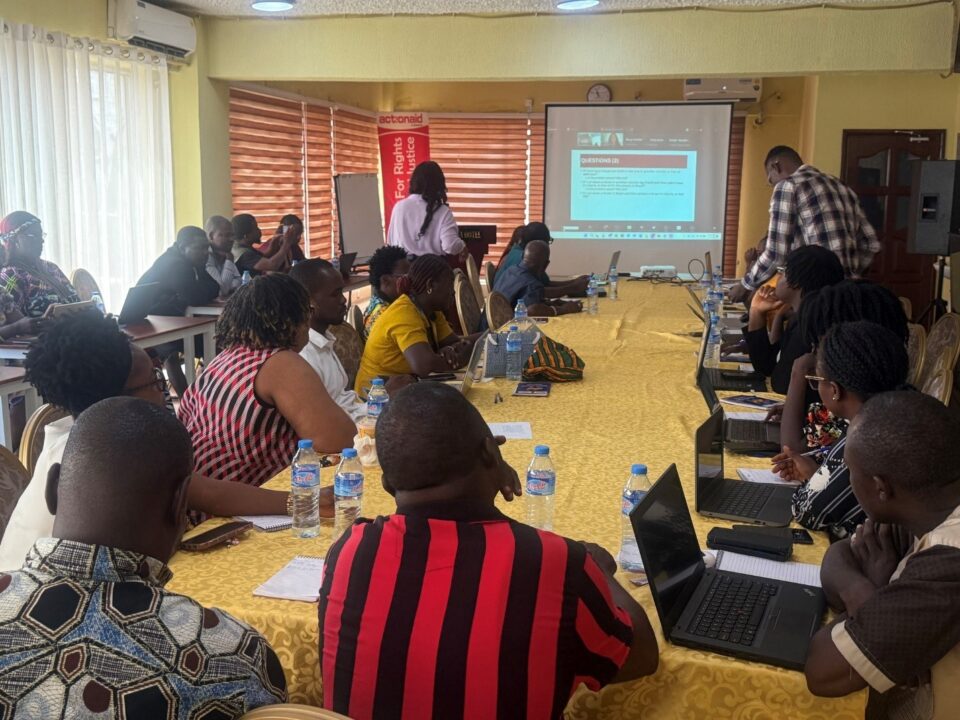The workshop aims to empower CSOs to protect community rights, understand the implications of carbon trading, and ensure that the voices of forest-dependent communities are central to any national climate policy discussions.
“Let us remember, forests are not just carbon sinks, they are homes, history, and livelihoods for our people. All those who have protected them for generations deserve to be at the center of any climate solution,” said Madam Loretta A. Pope-Kai, Chairperson of the Liberia Civil Society Council and Executive Director of the Foundation for Community Initiatives, at the opening ceremony.
Participants, mainly from grassroots and environmental CSOs, expressed serious concerns over Liberia’s approach to carbon market engagement. Many emphasized the need for transparency, community consultation, and adherence to national laws such as the Forestry and Land Rights Acts. Several warned that a hasty or poorly regulated entry into carbon trading could exacerbate land conflicts, violate community rights, and deepen rural poverty.
“Where carbon dioxide is coming from, we must first eliminate the source. Once you cut off the source, you cut off the problem,” added Princess H. Gborlu, a youth climate advocate and National Coordinator of the Liberian Youth Biodiversity Network.
The training also seeks to mobilize a coalition of climate justice actors to present clear recommendations to policymakers, carbon developers, and international partners. Participants will help develop a strategic advocacy plan for the newly formed Climate Justice CSOs Network, including a specific focus on youth-led action.
This initiative comes at a time when Liberia is drafting a national carbon market policy framework, aimed at tapping into global carbon credit markets. While proponents view carbon trading as a potential revenue source for climate adaptation, many local communities remain skeptical.
In May, ActionAid Liberia recently conducted field visits to forest communities in Gibi (Margibi County), Gbarpolu County, and Grand Gedeh County, to document perspectives on the government’s carbon trading ambitions. Residents in these areas voiced overwhelming opposition, citing threats to their livelihoods, distrust in government institutions, and past experiences of exclusion from natural resource decisions.
“They are saying that if this deal passes, it means we will not be allowed to cut trees to build our houses? So, where will we be getting planks from to build? James Mulbah, the Town chief of Peter Town asked with disappointment in his voice, but responded say “We cannot agree to that deal when it comes to Liberia.
“If they bring that law, it will affect us, so we don’t agree to it,” said Jartu Johnson, a mother of four. Jartu continued, “If you don’t have money to build a good house, it means that your home will look like that of a kitchen,” she lamented.
They then stressed that the forests provide them with food, medicine, and building materials. If the government stops them from using them, life will become unbearable,” they told ActionAid Liberia. Community members from Gibi. Others warned that carbon deals could worsen inequality and create unrest in already impoverished regions.
According to the 2023 Liberia Forest and Climate Resilience Forum, an estimated 1.5 million Liberians, over a third of the population, live in forested areas. Despite this, rural communities remain among the most marginalized in the country, with poverty rates as high as 80% in some regions, compared to 30% in urban areas, according to a World Bank report.
Globally, carbon markets remain a contentious issue. At COP28 in the United Arab Emirates, countries pledged nearly $500 million toward loss and damage funds. However, critics argue that such amounts are insufficient given the scale of climate impacts on vulnerable countries like Liberia. Meanwhile, industrialized nations are increasingly encouraging forest-rich countries to trade carbon credits instead of cutting emissions at source.
As a social justice organization, ActionAid Liberia is committed to supporting marginalized groups and communities to ensure Liberia’s path to climate resilience is just, inclusive, and rooted in community participation. The carbon market training is a critical step in building civil society’s capacity to advocate for policies that benefit people and planet, not just profit.

